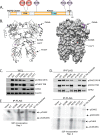Germline variants in cancer genes in high-risk non-BRCA patients from Puerto Rico
- PMID: 31780696
- PMCID: PMC6882826
- DOI: 10.1038/s41598-019-54170-6
Germline variants in cancer genes in high-risk non-BRCA patients from Puerto Rico
Abstract
Inherited pathogenic variants in genes that confer moderate to high risk of breast cancer may explain up to 50% of familial breast cancer. This study aimed at identifying inherited pathogenic variants in breast cancer cases from Puerto Rico that were not linked to BRCA1 or BRCA2. Forty-eight breast cancer patients that met the clinical criteria for BRCA testing but had received a negative BRCA1/2 result were recruited. Fifty-three genes previously implicated in hereditary cancer predisposition were captured using the BROCA Agilent cancer risk panel followed by massively parallel sequencing. Missense variants of uncertain clinical significance in CHEK2 were evaluated using an in vitro kinase assays to determine their impact on function. Pathogenic variants were identified in CHEK2, MUTYH, and RAD51B in four breast cancer patients, which represented 8.3% of the cohort. We identified three rare missense variants of uncertain significance in CHEK2 and two variants (p.Pro484Leu and p.Glu239Lys) showed markedly decreased kinase activity in vitro comparable to a known pathogenic variant. Interestingly, the local ancestry at the RAD51B locus in the carrier of p.Arg47* was predicted to be of African origin. In this cohort, 12.5% of the BRCA-negative breast cancer patients were found to carry a known pathogenic variant or a variant affecting protein activity. This study reveals an unmet clinical need of genetic testing that could benefit a significant proportion of at-risk Latinas. It also highlights the complexity of Hispanic populations as pathogenic factors may originate from any of the ancestral populations that make up their genetic backgrounds.
Conflict of interest statement
The authors declare no competing interests.
Figures



References
Publication types
MeSH terms
Substances
Grants and funding
LinkOut - more resources
Full Text Sources
Medical
Research Materials
Miscellaneous

